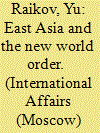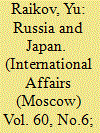| Srl | Item |
| 1 |
ID:
143726


|
|
|
|
|
| Summary/Abstract |
IN RECENT YEARS, the academic and political communities have been discussing the new world order (the subject that has acquired special consequence because of the geopolitical crisis in Ukraine) with its outlines barely discernible through the fog of chaotic and so far incomprehensible changes in politics and economy. One thing is clear, though: With each passing decade the world, international relations and the habitual course of life are changing increasingly.
|
|
|
|
|
|
|
|
|
|
|
|
|
|
|
|
| 2 |
ID:
138063


|
|
|
|
|
| Summary/Abstract |
THE MYSTIFYING TITLE is merely a statement that everything is possible in international relations even if recently a full-scale cooperation between Russia and Japan looked unreal.Today, they are pushed aside by the U.S. and rapidly developing China and play only the second fiddle in the APR political context. Their equally impressive potentials and images, as well as the cruel international realities of the early twenty-first century, force the two powers which figured prominently in the postwar history of Asia to seek ways to move closer together. Confronted with new geopolitical challenges and also threats not far from home, Russia and Japan are becoming, for objective reasons, natural strategic partners in East Asia.
|
|
|
|
|
|
|
|
|
|
|
|
|
|
|
|
| 3 |
ID:
123898


|
|
|
|
|
| Publication |
2013.
|
| Summary/Abstract |
CURRENTLY in a number of capitals in the Asia Pacific region, especially Beijing and Tokyo, passions are running high along with bellicose rhetoric and a relentless drumbeat. Politicians and the military compete in patriotism, fueling nationalism. A fresh example: the ASEAN nations have reacted rather nervously to the regional policy of China, which has recently begun issuing new passports that show a disputed map of the South China Sea (SCS). Beijing has also approved a new regulation which gives the Navy's leadership a greater scope of freedom to detain foreign vessels traveling in the waters that China claims as its own.1 According to The New York Times, "China has perturbed India, Vietnam and Japan with its more assertive line on longstanding territorial disputes."2 Therefore the theme of conflicts in East Asia persists in the pages of the international media and provides constant occasion for news coverage, stoking the fears of the international community about the state of affairs in one of the key regions of the world.
|
|
|
|
|
|
|
|
|
|
|
|
|
|
|
|